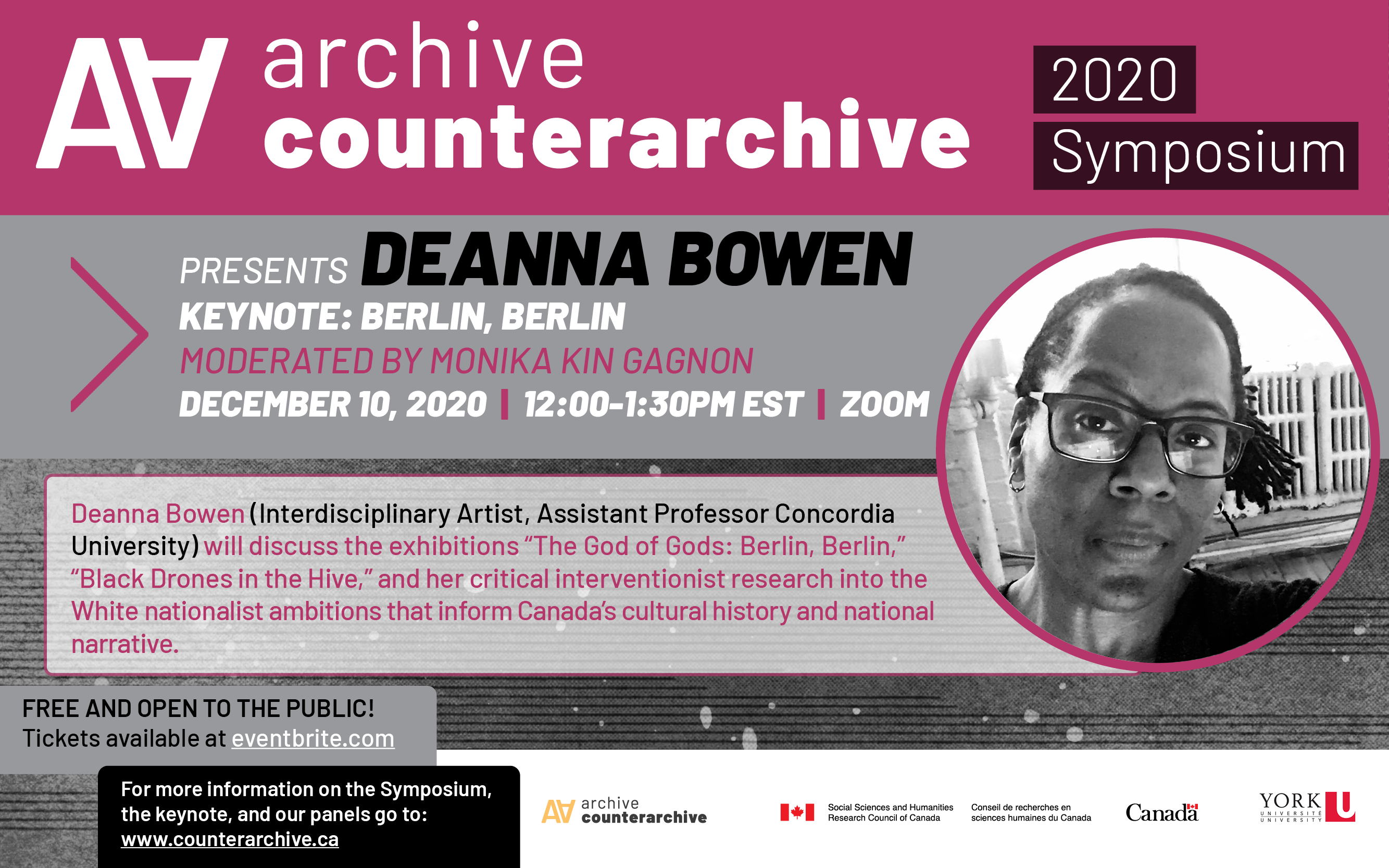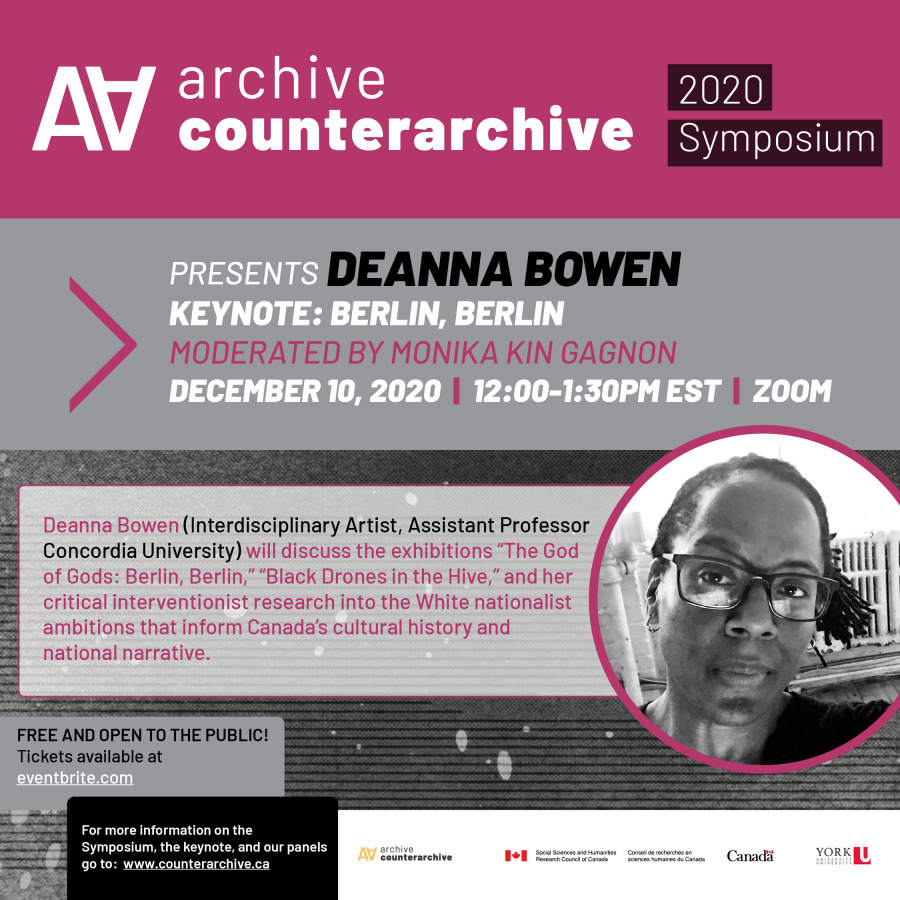It is our great pleasure to welcome you to join us online for A/CA's 2020 Symposium. The theme this year is Black lives and archival histories in Canada.
The talks are FREE and OPEN TO THE PUBLIC.
Make sure to REGISTER on EVENTBRITE for these talks. Registering gives you access to all three talks.
The talks will not be recorded. ASL Interpretation will be provided by Deaf Spectrum.
See our full schedule below (French version to follow)
DAY ONE: Thursday December 10, 2020.
12:00PM - 1:30PM EST | ZOOM | Keynote: Deanna Bowen | “Berlin, Berlin.” Moderated by: Monika Kin Gagnon.

Abstract: Deanna Bowen’s presentation involves self-reflection and presentation of two interdependent exhibitions presented at the 2020 Berlin Biennale and the Kitchener Waterloo Art Gallery September 18 – February 28, 2021. Respectively, "The God of Gods: Berlin, Berlin" and "Black Drones in the Hive" extend critical interventionist research of the White nationalist ambitions that inform Canada’s cultural history and national narrative. Specifically, "The God of Gods: Berlin, Berlin" is an off-site companion work to "Black Drones in the Hive” that examines the history of Berlin, Ontario (now Kitchener) and Berlin, Germany during WWI as a means to reveal the familial, geographic, cultural, and colonial entanglements between the British Commonwealth, Germany, Canada, the United States, and Africa from the mid 1700s. “Black Drones…” is a solo exhibition that looks at the regional histories surrounding the Kitchener Waterloo Art Gallery and greater Southern Ontario. The project looks at Six Nations history and the terms of the Haldimand Proclamation of 1784, which refers to Quebec’s Governor Sir Frederick Haldimand granting a tract of land to Mohawk Chief Thayendanegea’s (Joseph Brant) and the Haudenosaunee (Iroquois) for their alliance with the British during the American Revolution 1765-83. Accordingly, the American Revolution provides an opportunity to then reflect on a long, traumatic history of prolonged conflict that continues in the War of 1812-15, the US Civil War (1861-65), the Boer War (1899-1902), and World War I (1914-1918). “Black Drones...” is also an investigative process of production that works to excavate Black presence and erasure. Archival documents from the mid 1700s attest to African-American slave presence in both British and Six Nations communities. Other materials reveal a robust Black presence in the region, with a population of 60,000 in 1900. The quandary of this growth is its extraordinary decline to 18,000 by 1920 and so Deanna Bowen's research digs deeper into regional Ontario history to trace the ways that this decline is commingle with local, national and global preoccupations with Eugenics and population control.
Bio: Deanna Bowen is a descendant of two Alabama and Kentucky born Black Prairie pioneer families from Amber Valley and Campsie, Alberta. Bowen’s family history has been the central pivot of her auto-ethnographic interdisciplinary works since the early 1990s. She makes use of a repertoire of artistic gestures in order to define the Black body and trace its presence and movement in place and time. She is a recipient of a 2020 Governor General Award for Visual and Media Arts Award, 2016 John Simon Guggenheim Memorial Foundation Fellowship, and the 2014 William H. Johnson Prize. Her writing, interviews and art works have been published in Canadian Art, The Capilano Review, The Black Prairie Archives, and Transition Magazine. Bowen is editor of the 2019 publication Other Places: Reflections on Media Arts in Canada.
Day TWO: Friday December 11, 2020.
12:00PM - 1:30PM EST | ZOOM | PANEL 1: Place-based/Institutional Engagements with Black Histories: Janie Cooper-Wilson, Melissa Nelson, and Andrea Fatona in conversation. Moderated by: Warren Crichlow.

- Janie Cooper-Wilson: Proactively Dealing with Racism in the Archives
Abstract: Known as the Armchair Griot, Janie Cooper-Wilson presents her simple solution to combat racism through an understanding of the historical record. The presentation considers the lessons and experiences of the1960's Civil Rights Movement to the Anti-Racist Movement of today. She will highlight the importance of a practice of care for the archives of historical and contemporary Black communities with examples from her research and preservation work on cemeteries, genealogies and artifacts.
Bio: Janie has had a life-long passion for history, researching & documenting Black History as a crucial part of the collective history of Ontario. She is a strong advocate for the preservation of endangered historical buildings and early cemeteries and spearheaded the intensive public relations initiative to preserve the 1849 Oro African Methodist Episcopal Church, in Edgar, Ontario. Presently, Janie is attempting to save a crucial Black History Site in Haldimand County, from obliteration. Janie is the founder and Executive Director of the SilverShoe Historical Society and was the driving force behind the restoration and Designation of Bethel-Union and the Old Zion Presbyterian Cemeteries in Clearview Township. As well, Janie, with the assistance of her dedicated SilverShoe Team, has facilitated an Annual Memorial Candlelight Service for the past two decades. She is a sitting member of the Ontario Historical Society Board of Directors, serving as OHS Field Representative for Simcoe County and as Co - Chair of the OHS Cemetery Preservation & Defence Committee. Over her long career, Janie has been the author of numerous articles & publications and has been the recipient of many Awards, such as: 2012 OHS Carnochan Award; 2015 OMAH Historic Reconstruction Award; 2018 OBHS Harriet Tubman Award and in September 2018, she was inducted as one of Canada’s 100 Accomplished Black Women.
- Melissa Nelson: Critical Archival Thought: Integrating Anti-Racist and Anti-Oppressive Pedagogy and Training
Abstract: This presentation advocates for the inclusion of anti-racist and anti-oppressive education and training for emerging and existing archival professionals. Gaps within Library and Information Studies programs and archival training will be identified. More inclusive education and training is recommended to address current issues within the archival practice.
Bio: Melissa Nelson holds a Bachelor of Arts Honours degree in History, with a minor in Sociology, from Carleton University. She also completed a Master of Information Studies degree at McGill University. Her experience includes working at George Brown College Archives, The Presbyterian Church in Canada Archives, the Law Society of Ontario Archives and Clara Thomas Archives and Special Collections at York University. Melissa enjoys writing about history and archiving on her website.
- Andrea Fatona: Collecting and Re-coding Black Canada
Abstract: Andrea Fatona’s presentation will reflect upon her on-going interdisciplinary research project entitled, The State of Blackness: From Production to Presentation. Fatona will discuss the impulses that drive the project.
Bio: Andrea Fatona is an independent curator and an associate professor at the Ontario College of Art and Design University. She is concerned with issues of equity within the sphere of the arts and the pedagogical possibilities of art works produced by ‘other’ Canadians in articulating broader perspectives of Canadian identities. Her broader interest is in the ways in which art, ‘culture’ and ‘education’ can be employed by to illuminate complex issues that pertain to social justice, citizenship, belonging, and nationhood. She is the recipient of awards from Canada Council for the Arts, Ontario Arts Council, the Social Sciences and Humanities Research Council of Canada, and was the 2017/18 OCAD U-Massey Fellow. She is currently a Canada Research Chair II in the Faculty of Art. Fatona has published scholarly articles, catalogue essays, and book chapters in a range of publications.
Day Two: Friday December 11, 2020.
2:30PM-4:00PM EST | ZOOM | PANEL 2: Artistic Engagements with Archives: Nadine Valcin, Cara Mumford, and Debbie Ebanks Schlums in conversation. Moderated by: Malini Guha.

- Nadine Valcin: The Accidental Archive: Searching for Blackness in Canada’s National Audio-visual Archive
Abstract: The colonial archives (including our national archives) are full of silences, especially when it relates to marginalized populations. Beyond issues of metadata, description and encryption, traces of the Black presence in Canada are largely absent from official documents. Slivers about slavery are found in church and court records and ads for runaway slaves. The public domain audio-visual archives at Library and Archives Canada hold barely more about Black lives. A remedy to this lacuna is the broadening of the definition of archives to also hold accidental archives, that is, precious materials that unintentionally serve to document the Black Canadian experience.
Bio: Nadine Valcin is an award-winning bilingual filmmaker and media artist. She has directed four documentary projects for the National Film Board of Canada, including the critically-acclaimed Black, Bold and Beautiful (1999) and Une école sans frontières (A School without Borders, 2008) and is currently developing a fifth project, entitled Urban Tomorrows, about the right to the city. Nadine is currently an MFA candidate in Digital Futures at OCAD University and one of the Archive/Counter Archive artists-in-residence at Library and Archives Canada. She is a recipient of the OCADU Presidential scholarship, two Chalmers Arts Fellowships and a Drama Prize from the National Screen Institute.
- Cara Mumford: Treble and Bass: Layering Archival VHS with Phytograms in the creation of “René Highway’s Prism, Mirror, Lens”
Abstract: In 1989, Cree dancer René Highway created “Prism, Mirror, Lens,” his final choreography before he died of AIDS related complications in 1990. This dance work was inspired by the first chapter of Samuel Delany’s science fiction classic novel “Dahlgren,” interpreted as a vision quest, with the structure informed by a traditional four direction medicine circle. Cara Mumford’s thesis film, “René Highway’s Prism, Mirror, Lens” seeks to document the inspiration and collaborative creation process that resulted in this work. The primary footage Cara Mumford is using for her thesis film is from a 1989 archival VHS tape of one of the performances of “Prism, Mirror, Lens.” Because this cutting-edge work was lit entirely by slides created for the show, the archival video is very dark. Between the darkness of the original performance and the degradation of the video, this footage is currently hard to watch. One of the techniques Cara Mumford is using is to layer the archival footage with phytograms, which has the interesting effect of making the bad video not just tolerable but interesting. This technique also provides the viewer with an additional kinetic element that often gets lost in transferring a live dance performance onto video, as well as creating a counterpoint to the tracking lines so visible in the degrading VHS tape, providing an filmic improvisation between the tracking lines (treble) and phytograms (bass).
Bio: Cara Mumford is a Métis filmmaker, writer, and collaborative artist from Alberta, living in Peterborough, Ontario since 2010. Since becoming a filmmaker in 2006, Cara’s short films have screened regularly at the imagineNATIVE Film + Media Arts Festival in Toronto, and throughout Canada, in addition to festivals in the United States, Finland, and Australia. She has received industry training through Telefilm Canada (2010/11), Bell Media’s Diverse Screenwriters Program (2012), and the imagineNATIVE Film Festival’s Story Lab (2014) and Producer Mini-Lab (2015). Cara completed one year of development for her futuristic project, The Red Card, with the National Film Board’s Digital Studio (2016/17) and created a short film set in that world through the 7th annual Charles Street Video/imagineNATIVE residency. In 2018-2019, Cara was selected for the National Screen Institute’s IndigiDocs program to create a dance documentary with Christine Friday about the Friday family’s experience at residential school. She is currently working on her MFA in Film at York University, creating a documentary about Cree dancer René Highway’s last choreography, Prism, Mirror, Lens.
- Debbie Ebanks Schlums: Locating Archives in the Jamaican Diaspora
Abstract: Colonial perspectives permeate official archives of Caribbean peoples and distort or ignore the meaningful information that exists as family stories, environmental knowledge, embodied practices, and other archives of quotidian life. Influenced by Indigenous teachings regarding memory preservation, Debbie Ebanks Schlums' doctoral research expands this research methodology to engage the Jamaican Diaspora in the Greater Toronto Area in co-creating an audio-visual archive. Her presentation will further address long-standing African Diasporic relations with Indigenous communities through nascent research of the newly formed art collective, the Odeimin Runners Club.
Bio: Debbie Ebanks Schlums is a PhD Student in Cinema and Media Studies at York University. She is a multidisciplinary artist exploring themes of migration and anti-colonial actions through community engagement, materials, and conversation. She is a recipient of the Susan Crocker and John Hunkin Scholarship in the Fine Arts, Ontario Arts Council and Canada Council Visual Arts Grants, and is an Elizabeth Greenshields Foundation Fellow and former Co-Director of the Fabulous Festival of Fringe Film from 2016 to 2020 and Co-Producer of Saugeen Takes on Film.
****FRENCH VERSION BELOW****
Intervenants×tes :
JOUR UN: Jeudi 10 décembre
12:00 – 13:30 HE | CONFÉRENCE LIMINAIRE | ZOOM | Deanna Bowen : Berlin, Berlin. Animée par Monika Kin Gagnon.
Résumé : La présentation de Deanna Bowen suggère l’introspection et la présentation de deux expositions indépendantes présentées en 2020 à la Biennale de Berlin et à la Galerie d’art de Kitchener Waterloo du 18 septembre au 28 février 2021. Les expositions “The God and Gods: Berlin, Berlin” et “Black Drones in the Hive” prolongent respectivement les recherches critiques interventionnistes des ambitions du nationalisme blanc qui transmettent l’histoire culturelle canadienne, ainsi que les récits nationaux. Précisément, "The God of Gods: Berlin, Berlin" est une œuvre accompagnatrice hors site de “Black Drones in the Hive” qui examine l’histoire de la ville de Berlin en Ontario (devenu Kitchener) et la ville de Berlin en Allemagne pendant la Deuxième Guerre mondiale. Cette exposition met en lumière l’implication familiale, géographique, culturelle et coloniale entre le Commonwealth d’Angleterre, de l’Allemagne, du Canada, des États-Unis et du continent d’Afrique à partir du milieu des années 1700. "Black Drones…" est une exposition en solo qui jette un regard sur les histoires régionales des environs de la Kitchener Waterloo Art Gallery et des régions du sud de l’Ontario. Le projet se penche sur l’histoire des Six Nations, ainsi que sur les termes de la Proclamation Haldimand de 1784, qui font référence au Gouverneur du Québec Sir Frederik Haldimand qui accorda un décret accordant des terres au Chef mohawk Thayendanegea (Joseph Brant) et aux Haudenosaunees (Iroquois) pour leur alliance avec les Britanniques durant la Révolution américaine de 1765 à 1783. Par conséquent, la Révolution américaine donne la chance de réfléchir à une longue et traumatisante histoire concernant un conflit qui s’est prolongé jusqu’à la Guerre de 1812 à 1815, la Guerre civile américaine (1861 à 1865), la Seconde Guerre des Boers (1899 à 1902), ainsi que la Première Guerre mondiale (1914 à 1918). "Black Drones…” est un outil d’enquête qui sert également à mettre en lumière l’effacement et la présence des Noirs. Des documents d’archives datant du milieu des années 1700 attestent de la présence d’esclaves afro-américains dans les communautés britanniques et celles des Six Nations. D’autres informations ont également révélé une forte présence noire dans la région avec une population de 60 000 habitants en 1900. La perplexité de cette croissance se retrouve dans son extraordinaire déclin à 18 000 habitants dès 1920. Les recherches de Deanna Bowen creusent davantage l’histoire régionale ontarienne afin de retracer les raisons qui ont provoqué cette préoccupation à une échelle locale, nationale et globale, notamment avec le mouvement eugéniste et le contrôle des populations.
Bio : Deanna Bowen est une descendante de deux familles pionnières de Black Prairies de la région de l’Amber Valley et de Campsie en Alberta, qui sont originaires de l’Alabama et du Kentucky. L’histoire de la famille de Bowen a été au centre de ses travaux interdisciplinaires depuis le début des années 1990. Elle utilise un répertoire de gestes artistiques afin de définir le corps noir, ainsi que de retracer sa présence et son mouvement en temps et en lieu. Elle est récipiendaire en 2020 du prix du Gouverneur général en arts visuels et en arts médiatiques, de la Bourse John Simon Guggenheim Memorial Foundation en 2016, ainsi que du prix William H. Johnson en 2014. Ses écrits, entrevues et œuvres artistiques ont été publiés dans le Canadian Art, The Capilano Review, The Black Prairie Archives et le Transition Magazine. Bowen dirige également en 2019 la publication Other Places : Reflections on Media Arts in Canada.
JOUR DEUX: Vendredi 11 décembre
12:00 – 13:30 HE | Panel 1 | ZOOM :Melissa Nelson, Andrea Fatona et Janie Cooper-Wilson. Conversation animée par Warren Crichlow.
- Janie Cooper-Wilson: Proactively Dealing with Racism in the Archives
Résumé : Connue en tant que Armchair Griot, Janie Cooper-Wilson nous présente ses solutions afin de combattre le racisme à travers la découverte de documents historiques. La présentation prend en considération les leçons et les expériences qui émanent du mouvement américain des droits civiques des années 1960 à celles du mouvement antiraciste d’aujourd’hui. Elle soulignera l’importance d’une pratique précautionneuse envers les archives historiques et contemporaines des communautés noires par l’entremise d’exemples provenant de ses propres recherches et de son travail de préservation des cimetières, des généalogies et d’objets anciens.
Bio : Janie a depuis toujours une passion pour l’histoire, la recherche et la documentation de l’histoire des noirs en tant que partie intégrale de l’histoire collective de l’Ontario. Elle est une défenderesse déterminée en ce qui a trait à la préservation d’édifices historiques et de cimetières anciens en voie de disparition. Elle est à l’origine d’intenses initiatives auprès des relations publiques afin de préserver l’église épiscopale méthodiste africaine d’Edgar en Ontario. Janie tente en ce moment de sauver de l’éradication un important site historique noir situé dans le comté de Haldimand. Janie est la fondatrice et la directrice générale de la Société historique SilverShoe. Elle a également joué un rôle crucial dans la restauration et la dénomination de Bethel-Union et de Old Zion Presbyterian Cemeteries à Clearview Township. De plus, Janie a animé depuis les deux dernières années, avec l’assistance de la dévouée équipe de SilverShoe, une cérémonie annuelle aux chandelles. Elle est un membre en exercice au conseil d’administration de la Société historique de l’Ontario (SHO). Elle occupe également le poste de représentante sur le terrain du SHO du comté de Simcoe, en plus d’être coprésidente du comité de la préservation et de la défense des cimetières de la SHO.Tout au long de sa carrière, Janie a écrit de nombreux articles et publications, et a également été récipiendaire de plusieurs prix tels que le Carnochan Award de la SHO en 2012, le OMAH Historic Reconstruction Award en 2015 et le OBHS Harriet Tubman Award en 2018. Elle a été intronisée en septembre 2018 dans le palmarès des 100 femmes noires les plus accomplies au Canada.
- Melissa Nelson: Critical Archival Thought: Integrating Anti-Racist and Anti-Oppressive Pedagogy and Training
Résumé : Cette présentation préconise l’inclusion de l’éducation antiraciste et anti-oppressive, ainsi que la formation de professionels×lles d’archives existantes et émergentes. Les écarts au sein des programmes de sciences de l’information et de la bibliothèque seront identifiés. Une éducation et une formation plus inclusive est recommandée afin d’adresser les problèmes courants liés aux pratiques archivistiques.
Bio : Melissa Nelson détient un baccalauréat en arts avec une majeure en histoire et une mineure en sociologie de l’Université Carleton. Elle a également complété une maîtrise en sciences de l’information de l’Université McGill. Son expérience de terrain comprend la George Brown College Archives, The Presbyterian Church in Canada Archives, The Law Society of Ontario Archives et la Clara Thomas Archives and Special Collections de l’Université York. Melissa apprécie écrire sur l’histoire et l’archivage sur son site Internet.
- Andrea Fatona: Collecting and Re-coding Black Canada
Résumé : La présentation d’Andrea Fatona propose une réflexion sur son propre projet de recherche interdisciplinaire en cours intitulé The State of Blackness: From Production to Presentation. Fatona discutera des motivations derrière son projet.
Bio : Andrea Fatona est une programmatrice indépendante et une professeure adjointe à l’Université de l’École d’art et de design de l’Ontario (OCAD). Elle se soucie des problèmes liés à l’équité dans le domaine des arts et des possibilités pédagogiques d’œuvres d’arts produites par les « autres » canadiens×ennes en énonçant les perspectives générales des identités canadiennes. Son intérêt général se penche sur la façon dont l’art, la culture et l’éducation peuvent être employées afin de mettre en lumière des problèmes complexes qui concernent la justice sociale, la citoyenneté, l’appartenance et la nationalité. Elle est récipiendaire de prix provenant du Conseil des arts du Canada, du Conseil des arts de l’Ontario, du Conseil de recherches en sciences humaines du Canada, et a été boursière de l’OCAD et du Collège Massey de 2017 à 2018. Elle est en ce moment Chaire de recherche du Canada à la Faculté des Arts. Fatona a publié des articles académiques, des catalogues d’essais, ainsi que des chapitres de livres dans diverses publications.
14:30-16:00 HE | Panel 2 | ZOOM: Conversation entre Nadine Valcin, Cara Mumford et Debbie Ebanks Schlums. Animée par Malini Guha.
- Nadine Valcin: The Accidental Archive: Searching for Blackness in Canada’s National Audio-visual Archive.
Résumé : Les archives coloniales (incluant nos archives nationales) sont remplies de silences, surtout lorsqu’elles traitent des populations marginalisées. Au-delà des problèmes liés aux métadonnées, aux descriptions et aux cryptages, les traces de la présence des noirs au Canada sont en grande partie absentes des documents officiels. On retrouve certains fragments à propos de l’esclavagisme dans des églises et de la documentation judiciaire, ainsi que dans des publicités de défilés d’esclaves. De plus, les archives audiovisuelles du domaine public qui se trouvent à Bibliothèque et archives du Canada ne contiennent qu’une quantité infime d’informations à propos de la vie des noirs. Une solution à cette lacune se retrouve dans l’élargissement des modes de pensée et dans la résolution des archives à tenir des archives accidentelles, c’est-à-dire, du matériel précieux qui a servi à documenter involontairement l’expérience afro-canadienne.
Bio : Nadine Valcin est une réalisatrice et une artiste médiatique bilingue primée. Elle a réalisé quatre projets de documentaire pour l’Office national du film du Canada, incluant les films Black, Bold and Beautiful (1999) et Une école sans frontières (A School Without Borders, 2008) qui ont été salués par la critique. Elle travaille en ce moment sur un cinquième projet intitulé Urban Tomorrow qui traite du droit de la ville. Nadine est présentement candidate à la maîtrise au programme Digital Futures de l’Université de l’OCAD et l’une des artistes en résidence d’Archives/Contre-Archives à Bibliothèque et Archives Canada. Elle est également récipiendaire de la bourse OCADU Presidential, de deux bourses Chalmers Arts, ainsi que du prix Drama Prize de la National Screen Institute.
- Cara Mumford: Treble and Bass: Layering Archival VHS with Phytograms in the creation of “René Highway’s Prism, Mirror, Lens”
Résumé : En 1989, le danseur Cri René Highway a créé sa dernière chorégraphie « Prism, Mirror, Lens » avant son décès dû à des complications liées au SIDA en 1990. Cette routine de danse a été inspirée par le premier chapitre du classique de la science-fiction « Dahlgren » écrit par Samuel Delany. Elle est interprétée en tant qu’une quête visuelle accompagnée d’une structure inspirée par la roue de médecine traditionnelle séparée en quatre parties. Le projet de création de maîtrise de Cara Mumford, « René Highway’s Prism, Mirror, Lens » tente de documenter l’inspiration et le processus de création collaborative qui donné vie à cette œuvre.
La source principale qu’utilise Cara Mumford pour son projet de création de maîtrise provient d’une cassette de type VHS d’archive de l’une des performances de « Prism, Mirror, Lens ». Étant donné que ce travail de pointe a été entièrement éclairé par des diapositives spécialement créées pour la performance, la qualité visuelle de la vidéo d’archive est très sombre. Entre l’obscurité de la performance originale et la dégradation de la vidéo, les images sont en ce moment difficiles à visionner. L’une des techniques employées par Cara Mumford est d’étaler en photogrammes les images d’archives, ce qui a pour conséquence de créer avec ces mauvaises images un effet tout à fait intéressant. Cette technique donne également au spectateur un élément cinétique supplémentaire qui se perd normalement lors de l’enregistrement de performance de danse sur vidéo. Cela crée également un contrepoint avec les lignes de calibration qui sont visibles sur les images retrouvées dans des cassettes VHS en cours de dégradation, créant ainsi une improvisation filmique entre les lignes de calibration (aigus) et les photogrammes (basses).
Bio : Cara Mumford est une réalisatrice, une autrice et une artiste collaboratrice métisse originaire de l’Alberta qui vit à Peterborough en Ontario depuis 2010. Depuis les débuts de Cara en 2006 en tant que réalisatrice, ses courts métrages ont été présentés à maintes reprises au festival imagineNATIVE Film + Media Arts de Toronto, et également à travers le Canada, en plus d’avoir été projeté dans différents festivals aux États-Unis, en Finlande et en Australie. Elle a reçu sa formation en industrie cinématographique à Téléfilm Canada (2010/11), au programme de diversité scénaristique de Bell Média (2012), à l’atelier Story Lab du festival de film imagineNATIVE (2014) et au Producer Mini-Lab (2015). Cara a complété un an de développement pour son projet futuriste The Red Card, avec l’appui du Studio Interactif de l’Office National du Film (2016/17), et a réalisé un court métrage se déroulant dans ce monde grâce à sa nomination lors de la septième édition annuelle de la résidence Charles Street Video/imagineNATIVE. En 2018-2019, Cara a été sélectionné pour le programme IndigiDocs du National Screen Institute afin de réaliser un documentaire sur la danse avec Christine Friday qui traite de la famille Friday et de leur expérience d’internat. Elle est en ce moment candidate à la maîtrise en cinéma à l’Université York où elle travaille sur un documentaire qui traite de « Prism, Mirror, Lens », la dernière chorégraphie du danseur Cri, René Highway.
- Debbie Ebanks Schlums: Locating Archives in the Jamaican Diaspora
Résumé : Les perspectives coloniales s’imprègnent des archives officielles de la population caribéenne, et déforment ou ignorent les informations importantes qui existent dans les histoires familiales, les connaissances environnementales, les pratiques incarnées et d’autres activités de la vie au quotidien. Influencées par les enseignements autochtones en ce qui a trait à la préservation de la mémoire, les recherches doctorales de Debbie Ebanks Schlums élargissent cette recherche méthodologique afin d’impliquer la diaspora jamaïcaine de la région du Grand Toronto en cocréant une archive audiovisuelle. Sa présentation abordera sur les relations de longue date de la diaspora africaine avec les communautés autochtones à travers les recherches émergentes provenant du nouveau collectif d’artistes, le Odemin Runners Club.
Bio : Debbie Ebanks Schlums est étudiante au doctorat en études de Cinéma et des Médias à l’Université York. Debbie Ebanks Schlums est une artiste multidisciplinaire qui explore les thèmes de la migration et des actions anticoloniales à travers l’engagement communautaire, matériel et conversationnel. Elle est récipiendaire de bourses provenant de la Susan Crocker and John Hunkin Scholarship in the Fine Arts, du Conseil des arts de l’Ontario et du Conseil des arts du Canada pour les arts visuels. Elle est de plus une boursière de la Fondation Elizabeth Greenshields et elle était la codirectrice du Fabulous Festival of Fringe Film de 2016 à 2020 et la coproductrice de Saugeen Takes on Film.




